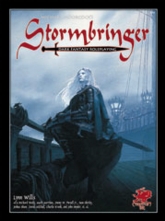
Percy Fawcett went into the Amazon one last time, but he didn't come back.
In the last few months, I’ve read two riveting books about humanity’s drive to survive (and thus “conquer”) the most inhospitable environments on the planet. First up was
The Lost City of Z, a historical account of the explorer
Percy Fawcett‘s expeditions into the Amazon. The second was Dan Simmon’s
The Terror, a fictionalized (complete with supernatural elements) account of the
doomed Franklin expedition to find the Northwest Passage.
I thoroughly enjoyed both books, different as they are, and found myself utterly engrossed in the almost impossibly difficult struggles to survive in environments where man was clearly not meant to tread. In both cases, the natural environment is so inimical to human life that it is perceived by the survivors/victims as possessing an active, malevolent desire to destroy them.
It makes for gripping reading. But being a gamer, it also made me wonder why Man vs. Nature struggles, so compelling to read as narratives, are so rare in roleplaying games.
My instinctive reaction to a typical Man vs. Nature conflict as a roleplaying episode is that it would be rather boring, although I’m not immediately sure why that is. There is nothing about game rules that would stop you from putting together a survival scenario like the ones described in the two books above. Consider the roleplaying actions a sea-based arctic survival scenario would involve:
- Successfully navigate your ship through icy waters and avoid getting lost or trapped in the ice.
- Send expeditions out to hunt for food, often hunting dangerous animals (think polar bears).
- Avoid scurvy and disease.
- Keep party morale up and put down mutinees as needed.
- Jury-rig shelter and equipment to stay alive.
- Repair continual damage inflicted on your ship by the environment.
- Avoid going mad yourself.

Trust me, getting eaten by a troll is a much better fate than scurvy.
Each of those could be broken down into discrete, accomplishable roleplaying activities; most games have skills and rule systems that would accomodate these activities. So why don’t more games feature environmental survival as the core challenge? Why doesn’t that sound more
fun?
In most RPGs I’ve played, weather, environmental danger, and survival are abstracted into a few modifiers or die rolls done on the side—and usually just to find out if you’ll suffer any combat penalties from starvation or snowy terrain. Or else the challenge of survival is represented by a handful of “environmental challenges” that you overcome once and then get on with the scenario’s other, more interesting challenges. The handful of games I’ve played that featured straight environmental challenges (like the iceberg-scaling in “The Trail of Tsathoggua” for Call of Cthulhu) were actually kind of boring. The players rolled dice, occasionally took damage or suffered a penalty when they failed a roll, and then we got on with more interesting stuff. There was neither much tension in the challenge nor a meaningful sense of accomplishment upon overcoming it.
Have you ever run a game that featured explicit environmental challenges that really worked? Have you ever made the challenge of simply surviving something that was as tense and entertaining as an epic battle or other more traditional roleplaying challenge? How did you do it?
Note: for a related discussion, see Justin Achilli’s thoughts on the concept of exploration in games. I think a big part of a successful exploration-based game would be getting the “survival” part down solid, since part of the historical allure of exploration is the challenge of surviving in the strange new environment you’re exploring. And I think it’s telling that genuine exploration and environmental survival aren’t prominent in most published RPGs.




 by
by 
 I don’t know if it qualifies as a meme (or if the cool people are even still using that word), but Ken Hite started something nifty with his “Tour de Lovecraft” project. Hite read his way through H.P. Lovecraft’s stories and wrote up a short essay about each one—a combination of critical analysis and personal reflection. Although it started as a project on his blog, those essays have been published as a book (which I heartily recommend, should you ever decide to delve into Lovecraft yourself).
I don’t know if it qualifies as a meme (or if the cool people are even still using that word), but Ken Hite started something nifty with his “Tour de Lovecraft” project. Hite read his way through H.P. Lovecraft’s stories and wrote up a short essay about each one—a combination of critical analysis and personal reflection. Although it started as a project on his blog, those essays have been published as a book (which I heartily recommend, should you ever decide to delve into Lovecraft yourself).


